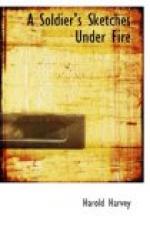We found fun in all sorts of things, made fun of all sorts of things. That we could do so and did do so may appear strange—it seems strange sometimes to me now. But ’twas a merciful thing that we were able to.
CHAPTER VI.
The “Make” Of A British trench.
The four following sketches will, I hope, give a fairly clear and accurate idea of the construction of a British trench. The first depicts one of my comrades (who was also a brother-artist by profession, and a brother-sniper) sitting reading, during a surcease of the firing, on the firing platform in a trench corner. It will be noticed that he wears his sleeping cap. Very close and handy are his tall jack-boots—so serviceable in wet weather and heavy mud. My artist-friend, I should like to remark, was considered among snipers a great shot, and there is no doubt that he often did deadly work with his rifle.
[Illustration: A trench sniper resting.]
After the trench has been dug out the sandbags are placed along the top so as to form what is called a “parapet.” Then the trench is dug deeper still and the firing platform is put in. Next the vertical struts of wood are put in position with wiring in between to hold back the mud, and in places where it is possible blocks fill in gaps to strengthen the structure. Finally the bed of the trench is boarded over with long heavy planks, some of which require two men to carry them; these are very often placed on bricks or blocks of wood to give air spaces underneath to keep them dry as far as possible. The trench is now completed as far as its construction is concerned, but it is left to be “furnished” with any supplies that happen to be handy. One of the first essentials is naturally the fireplace. This, as in the present instance, is very often an old tin pail with a few holes knocked in it, somewhat similar to the one used by Mr. Wilkie Bard in his famous sketch, “The Night Watchman.” The fuel consists of charcoal, wood and coke, to get which fully lit it is usual to swing the receptacle round and round so as to create a draught and start the contents thoroughly on the go. There is a great danger attending this, for if the Germans catch a glimpse of the brazier being whirled in the air they immediately locate the whirler and begin firing in his direction.
The black patch in the centre of the picture represents the sniping place, which is a thick piece of iron let into the parapet with a hole bored through it large enough to take the muzzle of the rifle. It also allows enough space for the sniper to see through, and, with the aid of the periscope, held usually by a comrade at his side, he is able to get the sight for his firing.
A TRAVERSE.
[Illustration: A traverse.]




